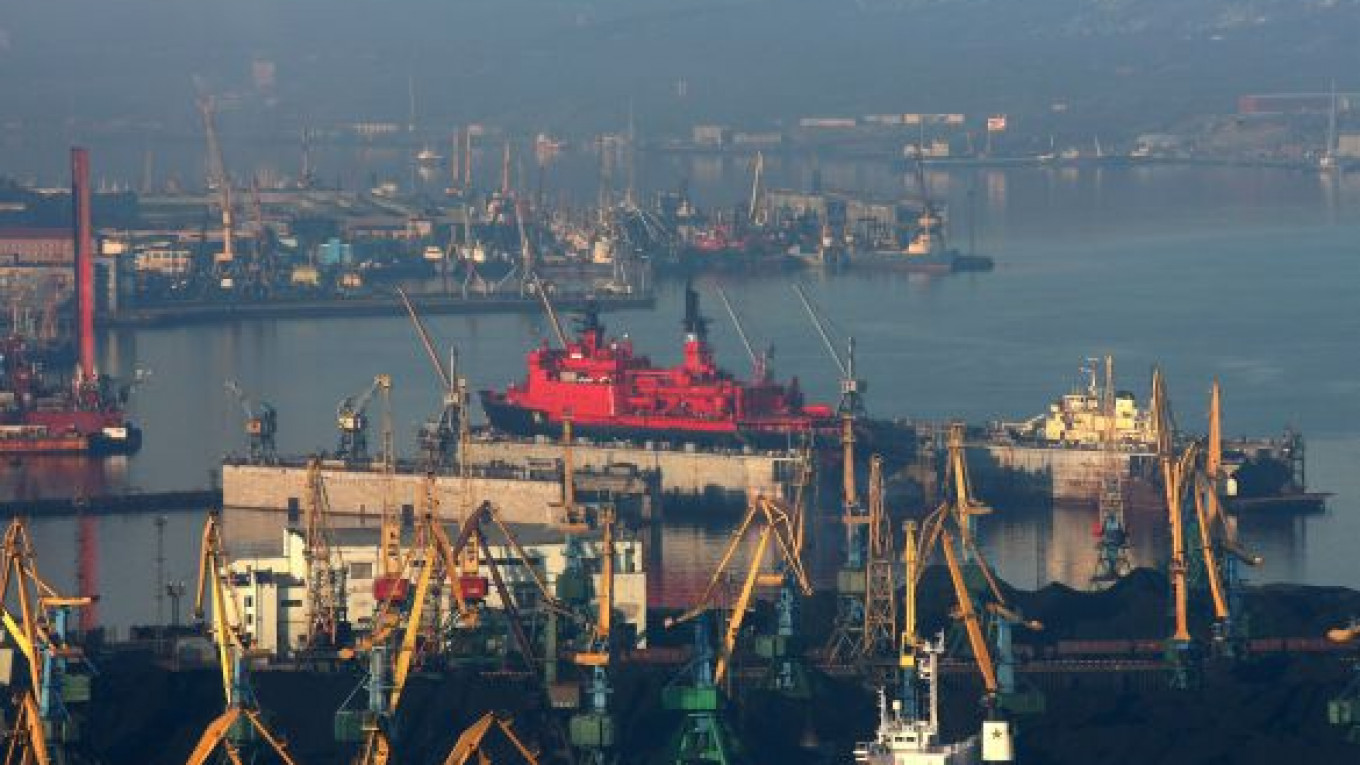Norilsk Nickel plans to spend $370 million to double its shipments across the Arctic Ocean by 2016 as global warming allows the route to rival the journey through the Suez Canal.
Norilsk will raise deliveries of metal and coal through the Northern Sea Route from Murmansk, near Finland, to China and South Korea, deputy chief executive Sergei Buzov said. The company shipped 10,000 tons in 2010.
The project has proved "very successful," he said in an interview in Moscow. Transportation costs are $120 a ton, he said, less than half that using the traditional passage through Suez, location of the world's busiest international canal.
Shrinking of Arctic sea ice to its third-smallest size on record last year is opening previously frozen routes. Icelandic President Olafur Ragnar Grimsson said in 2010 the pace of global warming in the Arctic was three times faster than elsewhere, shrinking journeys between Asia, Europe and America by 40 percent to 50 percent and creating interest from nearby countries.
Novatek and LUKoil are among businesses anticipating that they will be able to save money using the Arctic route to meet surging Asian demand for commodities. While the journey still needs the use of icebreakers as escorts or ice-class transportation vessels, it takes 18 days, compared with about 40 through Suez, Buzov said.
"The thinning and retreat of Arctic ice is combining with the thawing of the permafrost in northern Russia to make shipping via the Northeast Sea Route increasingly attractive and active during the lengthening summer season," said Cleo Paskal, associate fellow at Chatham House, a policy adviser in London. "This raises a series of urgent security, political and economic issues, and has the potential to turn the Bering Strait into a critical strategic chokepoint."
Russia is seeking to expand its presence in the Arctic and claims the underwater Lomonosov Ridge that links Siberia to the Arctic Sea bed, allowing the country to extend its reach to the North Pole. Prime Minister Vladimir Putin in September called for a "zone of peace" in the region as it opens up as a source of energy production and a transportation hub.
Novatek may export as many as seven condensate, or light crude, cargoes via Arctic waters this year as it tests the route with liquefied natural gas for Asia. A Suezmax tanker, with more than 120,000 tons deadweight, will be sent for the first time through the northern route in August, chief executive Leonid Mikhelson said June 17.
"Northern sea shipping will become a more profitable route than the Suez Canal," he told reporters in St. Petersburg. "This is already clear if you look at the contracts signed."
Since 2004, Norilsk has spent $720 million on five ice-class container ships for carrying metals and one tanker, Buzov said. They can cut through ice as thick as 1.5 meters.
In addition, the company will build a $170 million ice-class container ship by 2016 with equivalent capacity of 1,450 standard 20-foot containers, twice as large as its current vessels. The ship will deliver metals and cargoes such as sulfur, a byproduct of Norilsk's metals output. Exports of coking coal, due to be mined from Norilsk's north Siberian projects, will also be economically viable.
Norilsk plans to spend $200 million on infrastructure, including on the Arctic port of Dudinka and a railroad from its smelters, Buzov said. The nickel company, which also produces natural gas in Siberia to supply its metals manufacturing, will ship as much as 200,000 tons of gas condensate to Amsterdam and bring back oil products, he said.
The company plans regular voyages across the Arctic Ocean, Buzov said, adding that ships returning to Russia may bring back metals concentrate from its mines in Australia and Asia.
Arctic sea ice covered an average 4.9 million square kilometers in September 2010, the third lowest on record for the month, according to data on the web site of the U.S. National Snow and Ice Data Center.
A Message from The Moscow Times:
Dear readers,
We are facing unprecedented challenges. Russia's Prosecutor General's Office has designated The Moscow Times as an "undesirable" organization, criminalizing our work and putting our staff at risk of prosecution. This follows our earlier unjust labeling as a "foreign agent."
These actions are direct attempts to silence independent journalism in Russia. The authorities claim our work "discredits the decisions of the Russian leadership." We see things differently: we strive to provide accurate, unbiased reporting on Russia.
We, the journalists of The Moscow Times, refuse to be silenced. But to continue our work, we need your help.
Your support, no matter how small, makes a world of difference. If you can, please support us monthly starting from just $2. It's quick to set up, and every contribution makes a significant impact.
By supporting The Moscow Times, you're defending open, independent journalism in the face of repression. Thank you for standing with us.
Remind me later.






